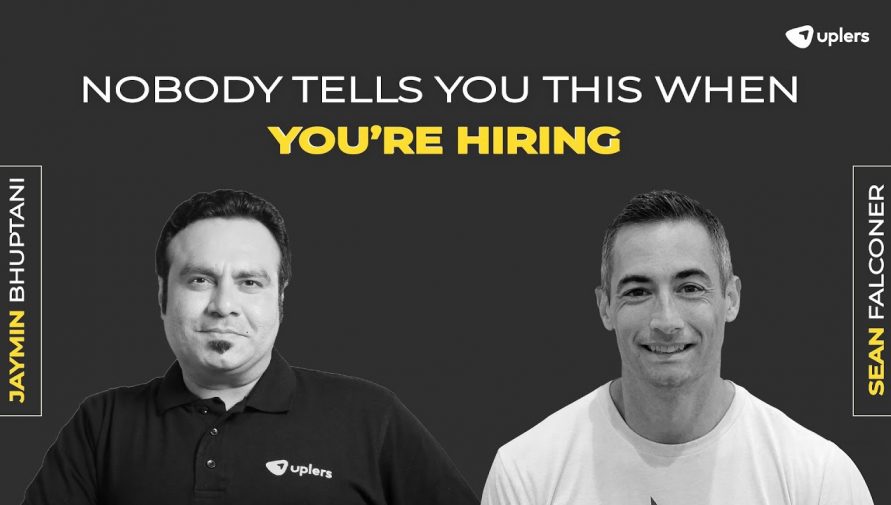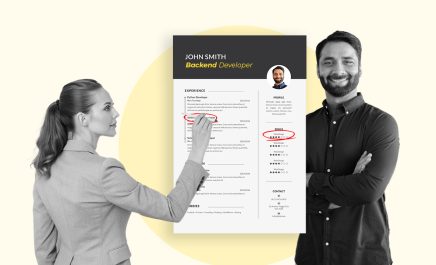How SaaS Startups Can Leverage AI to Hire the Right Talent
- Jaymin Bhuptani
- October 25, 2024
- 5 Minute Read

Hire-O-scope, a podcast by Uplers, hosted by Jaymin Bhuptani (CEO) talks about how AI is transforming the SaaS industry, building product startups and what it takes to make it a successful one. This podcast brings in guests who are either leaders in the SaaS community or are building funded product startups.
Jaymin, with this passion to solve the hiring challenges of SaaS startups when it comes to hiring the right engineering talents from India–this podcast aims to shed light on AI in recruitment, building startups with the right hire and the ever-evolving hiring landscape.
Hiring in Enterprise vs. Startups
Sean,
He explains how large companies never face issues when it comes to attracting candidates to a job post.
Startups, on the other hand, have to focus on employer branding to attract the right talent. There is no delegation of hiring in startups.
“You have to sell the vision to every candidate and be there in every process—you have to be more involved,” says Sean (Head of Marketing and Developer Relations at Skyflow, a Series B funded startup).
Challenges in Hiring for SaaS Startups
Startups, especially in the SaaS space, face stiff competition when it comes to attracting talent. Sean points out that candidates are often drawn to larger companies for the security and perks they offer, leaving startups to compete for a smaller pool of individuals who are both skilled and willing to take risks.
“For startups, it’s about finding people who are passionate about solving problems, people with grit and resilience,” he says.
The fast-paced nature of SaaS startups requires candidates who can adapt quickly, handle ambiguity, and are comfortable working in an environment where they’ll be expected to wear multiple hats.
Candidate Assessments: More than Just Skills
Assessing candidates in a startup environment is different from the structured processes used in larger companies. While enterprises like Google rely on rubrics and detailed assessment tools, startups often have to make quick decisions based on a candidate’s potential and fit with the company culture.
Sean stresses the importance of asking the right questions to uncover qualities beyond just technical skills.
“It’s not about checking boxes; it’s about seeing how they’ll contribute to your mission,” he explains.
This more personalized approach allows startups to find candidates who not only meet the technical requirements but also align with the company’s goals.
Tips for Startup Founders on Overcoming Hiring Challenges
Sean shares three simple but effective tips for startup founders:
- Always nurture relationships with talent: Even if you’re not hiring right now, keep in touch with potential candidates.
- Thoroughly evaluate candidates: Don’t rush the process. Look for people who resonate with your mission, not just those with technical expertise.
- Continuously refine your interview process: Regularly adjust your interview strategy to better identify the traits that are crucial for your company’s success.
Hiring Talent from India: A Rich Talent Pool
Jaymin sheds light on the growing trend of hiring talent from India, emphasizing how the country has become a key hub for technical talent.
With over 40% of the U.S. SaaS companies already leveraging India’s vast engineering pool, the advantages are clear. Sean also highlights this, stating:
“India is a treasure trove of talent, especially when it comes to engineering roles.”
India offers a cost-effective solution for SaaS startups looking to scale quickly while maintaining a high standard of talent.
Jaymin notes that with platforms like Uplers, it’s now easier than ever to tap into this talent, whether it’s for engineering, product development, or tech support.
“Uplers is designed to streamline the hiring process, making it easier for companies to find top-tier talent from India,” Jaymin adds.
Differences in Hiring Practices Between the US and India
Hiring in India differs significantly from the U.S. in several ways, one of which is the sheer volume of candidates.
Sean, who recently started hiring a few marketing roles from India, did mention that his company Skyflow has around 10% engineers working remotely from India. With his experience, he points out that while the U.S. market is more selective, Indian candidates often bring a more risk-averse mindset, focusing on job security.
“There’s a different approach in India—candidates tend to be more cautious,” Sean says. However, this is slowly changing as the Indian startup ecosystem evolves.
He also emphasizes that Indian candidates tend to defer to authority more than their Western counterparts, which can affect how managers approach communication.
“You need to ask the right questions and ensure clarity,” Sean advises. Understanding these cultural nuances is key to successfully managing Indian teams.
Managing Teams Across Cultural Differences
Managing cross-cultural teams can be a challenge, especially when it comes to communication styles.
Sean notes that Indian employees may be less direct in their communication and more deferential to authority.
“In India, you might not always get immediate feedback or pushback, so it’s important to create a space where people feel comfortable speaking up,” he explains.
Jaymin adds that fostering open communication and building trust is essential when managing a global team.
This not only helps in bridging cultural differences but also creates a more collaborative environment where employees feel empowered to contribute.
Tips for Founders and Managers Hiring in India
Sean also provides some practical advice for founders and managers looking to hire from India:
- Hire local recruiters: They understand the local market and the specific needs of the talent pool.
- Adapt your communication style: Bridging the cultural gap is crucial for effective management and team dynamics.
- Keep up with job market trends: This will help you attract and retain the right talent while staying competitive in the market.
By understanding these nuances, founders can make more informed hiring decisions and build stronger teams.
AI’s Role in Recruitment
The future of hiring is increasingly being shaped by AI, especially when it comes to scaling recruitment efforts. Sean and Jaymin discuss how AI is being used to automate parts of the hiring process, from resume screening to candidate matching.
“AI can help streamline the process, especially when you’re dealing with high volumes of candidates,” Sean notes.
However, both agree that while AI is helpful in managing the numbers, it’s important to keep the human element in the process to avoid biases.
Jaymin explains that at Uplers, they’re working on integrating AI tools to assist in making candidate assessments more efficient, particularly for large-scale hiring needs.
“AI is a tool, but it’s how you use it that makes the difference,” Jaymin emphasizes.
Hiring is a complex, ever-evolving process, but with the right strategies, tools, and an understanding of cultural differences, founders can build teams that not only meet their technical needs but also align with their company’s vision.
Reference


Thank you for submitting the details!
We will keep your information safe. Feel free to contact us with any questions at hello@uplers.com
Please check your email for next steps shared by Robert.

















